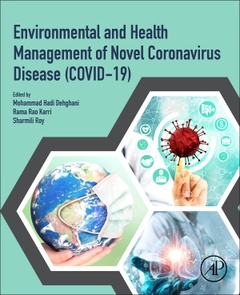Environmental and Health Management of Novel Coronavirus Disease (COVID-19)
Coordonnateurs : Hadi Dehghani Mohammad, Karri Rama Rao, Roy Sharmili

Environmental and Health Management of Novel Coronavirus Disease (COVID-19) examines mitigation measures that can be adopted at the time of a novel coronavirus outbreak to lessen environmental contamination and impacts on human health. The book discusses origin, structure and pathogenesis, epidemiology, environmental transmission and the potential spread routes of COVID-19 via surfaces, air, water, wastewater, medical waste and food products. It also covers guidelines and protocols for setting safety conditions to provide adequate health care and reduce the risk of infection in health and non-healthcare settings, along with preventative measures and disinfection technologies.
In addition, the book discusses challenges, opportunities and future perspectives, the global crisis, and global consequences on the environment and health. With contributions from experts, this book presents a multidisciplinary reference resource for virologists, microbiologists, public health professionals, environmental health managers and others engaged in the study and mitigation of the environmental and health impacts of the virus.
Section I. Introduction, transmission routes, and sampling technologies 1. An updated insight into the novel coronavirus disease, its detection, and health management approaches to combat the pandemic 2. Virus-sampling technologies in different environments 3. Mechanism and transmission routes of COVID-19
Section II. Remediation measures in waste and wastewater environments 4. Presence, detection, and persistence of SARS-CoV-2 in wastewater and the sustainable remedial measures 5. A comprehensive study of COVID-19 in wastewater: occurrence, surveillance, and viewpoints on its remedy 6. Route of SARS-CoV-2 in sewerage and wastewater treatment plants: dilution, decay, removal, and environmental transmission 7. Impediments of coronavirus in healthcare wastewater treatment and ways to ameliorate them 8. Handling and treatment strategies of biomedical wastes and biosolids contaminated with SARS-CoV-2 in waste environment
Section III. Environmental and health management aspects 9. Management of environmental health to prevent an outbreak of COVID-19: a review 10. A review of deciphering the successes and learning from the failures in preventive and health policies to stop the COVID-19 pandemic 11. Food safety, hygiene, and awareness during combating of COVID-19 12. An overview of food safety and COVID-19 infection: nanotechnology and cold plasma applications, immune-boosting suggestions, hygienic precautions 13. Public health management during COVID-19 and applications of point-of-care based biomolecular detection approaches 14. Prescription, over-the-counter (OTC), herbal, and other treatments and preventive uses for COVID-19
Section IV. Challenges and opportunities faced due to COVID-19 15. Addressing the global challenge of access to supplies during COVID-19: mask reuse and local production of alcohol-based hand rub 16. Challenges, opportunities, and future perspectives
Dr. Rama Rao Karri is a Professor (Sr. Asst) in the Faculty of Engineering, Universiti Teknologi Brunei, Brunei Darussalam. He has a Ph.D. from the Indian Institute of Technology (IIT) Delhi, Master’s from IIT Kanpur in Chemical Engineering. He has worked as a Post-Doctoral research fellow at NUS, Singapore for about six years and has over 18 years of working experience in Academics, Industry, and Research. He has experience of working in multidisciplinary fields and has expertise in various evolutionary optimization techniques and process modelling. He has published 150+ research articles in reputed journals, book chapters, and conference proceedings with a combined Impact factor of 611.43 and has an h-index of 28 (Scopus - citations: 2600+) and 27 (Google Scholar -citations: 3000+). He is an editorial board member in 10 renowned journals and a peer-review member for more than 93 reputed journals and has peer-reviewed more than 410 articles. Also, he handled 112 articles as an editor. He also has the distinction of being listed in the top 2% of the world’s most influential scientists in the area of environmental sciences and chemicals for the Years 2021 & 2022. The List of the Top 2% of Scientists in the World compiled and published by Stanford University is based on their international scientific publications, the number of scientific citations for research, and participation in the review and editing of scie
- Covers the environmental transmission and spread of COVID-19
- Includes environmental disinfection technologies for prevention of COVID-19
- Provides guidelines, standards and protocols related to COVID-19
Date de parution : 06-2021
Ouvrage de 518 p.
15.2x22.8 cm
Thèmes d’Environmental and Health Management of Novel Coronavirus... :
Mots-clés :
2019-nCoV; Air; Alcohol-based hand rub; Biosensors; Biosolids; Bio-solids; Cold plasma; Comorbidities; Contact surfaces; Coronavirus; COVID pandemic; COVID-19 pandemic; COVID-19Dietary supplements; COVID-19Disposal; COVID-19Environment; COVID-19Environmental health management; COVID-19Feces; Covid-19FFP2Hand hygiene; COVID-19Food safety; COVID-19Food; COVID-19Global health; COVID-19Herbal; COVID-19SARS-CoV-2 inactivation; Diabetes; Fecal-oral transmission; Feces; Food packaging; Food safety management; Health care wastes; Health management; Health policy; Herd immunity; Hygiene; Hypertension; Immune-boosting; Infection prevention; IPC; Learning; Lockdown; Mask wearing; Masks; Molecular diagnostics; Municipal wastewater; N95Pandemic; Nano-biotechniques; Nanotechnology; OTC; Other treatment; Pandemic; Pandemics; PCR; Personal hygiene and sanitization; Personal protective equipment (PPE)Sanitary workers; Peru; POC diagnostics; Policy making; Prescription; Preventive measures; Preventive strategies; Preventive; Public health care; Respiratory syndrome; Sampling; SARS-CoV-2SARS-CoV-2Sewage treatment; SARS-CoV-2Sewerage; SARS-CoV-2Treatment; SARS-CoV-2Wastewater; SARS-CoV-2Wastewater-based epidemiology; SARS-SARS-CoV-2 transmission modes; Severe acute respiratory syndrome coronavirus 2Social distancing; Sustainable development; Sustainable measures; Treatment; Waste management; Wastewater



